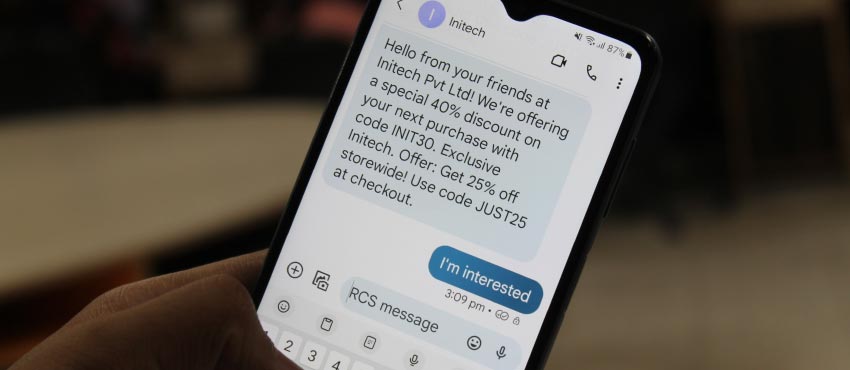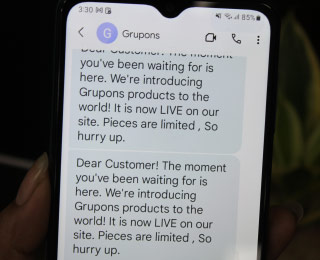Schedule SMS Messages to be Sent through a Bulk SMS Gateway
Here's how it typically works:
-
Access the Bulk SMS Gateway
Platform:
To schedule SMS messages, you'll need to log in to your account on the Bulk SMS gateway provider's platform. This is where you manage your SMS campaigns, contacts, and settings.
-
Compose the SMS Message:
Create the content of your SMS message. This will include the actual text that you want to send to your recipients. Some Bulk SMS gateways also allow you to personalize the messages with variables such as the recipient's name.
-
Upload or Import Recipient
List:
If you have a list of contacts to whom you want to send the scheduled SMS messages, you can upload or import this list into the Bulk SMS gateway platform. The platform may support different formats such as CSV, Excel, or simply copy-pasting the numbers.
-
Select Scheduled Delivery:
In the message composition or campaign setup section of the platform, you'll find an option to schedule the delivery time for your SMS messages. You can specify the date and time when you want the messages to be sent out.
-
Timezone Considerations:
Make sure to consider the timezones of your recipients when scheduling the SMS messages, especially if your recipients are located in different regions. The Bulk SMS gateway may offer options to choose the timezone for the delivery.
-
Preview and Review:
Before finalizing the scheduling, review the content of your SMS messages and the scheduled delivery time to ensure everything is accurate.
-
Confirm and Save:
Once you are satisfied with the message content and delivery schedule, confirm your settings, and save the scheduled SMS campaign.
-
Monitor and Modify (If
Needed):
After scheduling the SMS messages, you can monitor the status of your campaign in the gateway platform. If necessary, some gateways allow you to modify the scheduled delivery time or make changes to the message content before the scheduled time.
-
Scheduled Delivery:
The Bulk SMS gateway will take care of delivering the messages at the specified date and time. You don't need to be actively logged in during this process; the gateway's infrastructure handles the delivery automatically.
Note: It's important to note that the scheduling feature may vary slightly depending on the Bulk SMS gateway provider you choose. Some providers may have additional options such as setting recurring campaigns or defining specific delivery rules based on recipient responses or behavior.
Scheduling SMS messages through a Bulk SMS gateway is a convenient and effective way to plan and automate your communication strategy, ensuring that your messages reach the recipients at the most appropriate times.
Ensuring Successful Delivery of SMS Messages
Ensuring successful delivery of SMS messages through a Bulk SMS gateway involves a combination of best practices, monitoring, and maintaining good communication with your chosen gateway provider. Here are some essential steps to help you achieve successful SMS delivery:

-
Choose a Reliable Bulk SMS
Gateway Provider:
Selecting a reputable and reliable Bulk SMS gateway provider is crucial. Look for providers with a track record of high delivery rates, good network coverage, and positive customer reviews. A reliable gateway will have strong connections with various telecom carriers, improving the chances of successful delivery.
-
Check Number Formatting:
Ensure that the phone numbers of your recipients are correctly formatted. International numbers should include the country code, and local numbers should omit any special characters like spaces or dashes. Some gateway providers may offer tools to validate and format phone numbers in your recipient list.
-
Use an Updated and Clean
Contact List:
Maintain a clean and up-to-date contact list with accurate phone numbers. Regularly check for duplicates, inactive numbers, and opt-outs. Sending SMS to non-functional or invalid numbers can negatively affect your delivery rates.
-
Respect SMS Content
Restrictions:
Some countries or carriers have content restrictions for SMS messages. Avoid using spammy or prohibited content in your messages to ensure delivery and avoid being flagged as spam.
-
Optimize Message Length:
Be mindful of your message length. SMS messages are limited to 160 characters in standard GSM encoding (or 70 characters for Unicode). If your message exceeds this limit, it may get truncated, leading to confusion for the recipient.
-
Set Appropriate Sender ID:
Choose an appropriate sender ID that recipients can recognize and trust. Some gateways may allow you to use alphanumeric sender IDs (e.g., your company name) or numeric sender IDs (e.g., a dedicated short code).
-
➽ Monitor Delivery Reports: Many Bulk SMS gateways provide delivery reports that indicate the status of each SMS message sent. These reports can tell you whether the message was successfully delivered or if there were any failures or delays.
-
➽ Check Delivery Time: Consider the time zone of your recipients when scheduling SMS delivery. Sending messages at odd hours may result in lower response rates.
-
➽ Consider Redundancy: For critical messages, you may want to consider using multiple gateways or providers as a redundancy measure. If one provider experiences delivery issues, the other may still be able to deliver the messages.
-
➽ Test and Optimize: Conduct testing with a smaller batch of messages before sending out large-scale campaigns. This allows you to identify and address any potential delivery issues or formatting errors.
-
➽ Monitor Network Performance: Keep track of your gateway provider's network performance and uptime. If you notice a significant decline in delivery rates or frequent downtimes, consider reaching out to your provider for support or potentially switching to a more reliable service.
-
➽ Compliance with Regulations: Ensure compliance with local regulations and opt-in requirements for sending SMS messages, both in your country and the countries where your recipients are located.
Conclusion: By following these steps and maintaining good communication with your Bulk SMS gateway provider, you can increase the likelihood of successful SMS delivery and optimize the effectiveness of your SMS campaigns. Remember that successful delivery is not entirely under your control, as factors such as the recipient's network coverage, phone settings, and carrier policies also play a role.
Kind of Customer Support is Provided by Bulk SMS Gateway Providers
Bulk SMS gateway providers offer a range of customer support services to assist their clients in efficiently using their SMS messaging services. The level of support can vary depending on the provider and the specific plan or package a client has chosen. Here are the typical types of customer support offered by bulk SMS gateway providers:

-
Technical Support:
This is the backbone of any customer support offered by SMS gateway providers. Technical support is primarily concerned with resolving issues related to the functionality and performance of the SMS gateway. Customers can reach out to technical support when facing problems with message delivery, API integration, sender ID configuration, and other technical aspects.
-
Live Chat Support:
Many providers offer live chat support, enabling customers to get real-time assistance from support agents. Live chat is particularly useful for quick inquiries and basic troubleshooting.
-
SMS Delivery and Analytics
Reports:
Providers may offer detailed delivery reports and analytics to help clients assess the success of their SMS campaigns. This data can help clients optimize their messaging strategies.
-
Phone Support:
Some providers offer phone support, allowing customers to directly speak with support agents. This can be valuable for urgent matters that require immediate attention.
-
Community Forums:
Some providers maintain online community forums where clients can interact, share experiences, and seek help from other users and sometimes even support staff.
-
Ticketing System:
Providers often have a ticketing system in place to manage and track customer inquiries efficiently. Clients can submit their issues or questions through the ticketing system, and support agents respond accordingly.
-
Email Support:
Clients can contact support teams via email for more complex issues or for those that don't require an immediate response. Providers typically have dedicated email addresses for support queries.
-
Training and Onboarding:
For new clients, some providers offer training sessions or onboarding assistance to help them understand the platform and features thoroughly.
-
Social Media Support:
A few providers extend their customer support to social media platforms, where they respond to queries and comments from clients and potential customers.
-
Account Management:
Dedicated account managers are often assigned to larger or more demanding clients. These managers act as a single point of contact and work closely with clients to understand their requirements, offer personalized assistance, and ensure smooth service delivery.
-
Service-Level Agreements
(SLAs):
Some providers offer SLAs to guarantee a certain level of service quality, uptime, and response time for critical issues. SLAs provide clients with peace of mind and assurance about the reliability of the service.
-
Documentation and
Resources:
Providers usually offer comprehensive documentation, user guides, and FAQs to help customers understand the service features, functionalities, and how to integrate their systems with the SMS gateway APIs. These resources allow clients to troubleshoot common issues independently.
Conclusion: Overall, the goal of customer support provided by bulk SMS gateway providers is to ensure that their clients have a seamless experience using the service, troubleshoot any issues that may arise, and help them get the most out of their SMS marketing and communication efforts.
